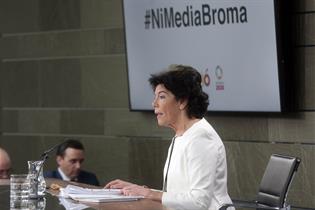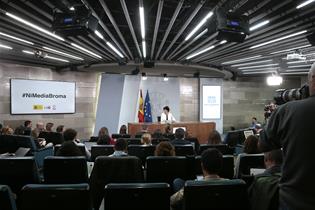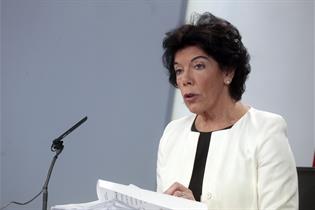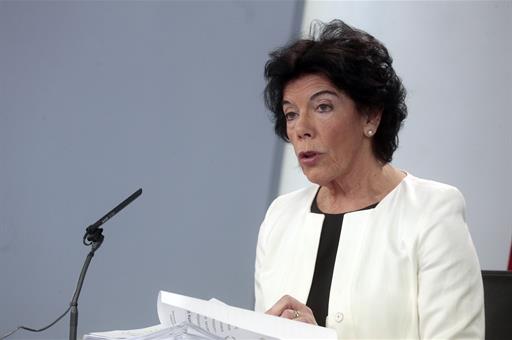Council of Ministers
Government makes further progress on "definitive eradication" of violence against women
Council of Ministers - 2018.11.23
The Minister for Education and Vocational Training, and Government Spokesperson, Isabel Celaá, reported that the Council of Ministers approved a declaration that "contains the firm will of this government to make further progress on the definitive eradication of all forms of violence against women on grounds of sex or gender". The Council of Ministers also agreed new measures to improve the protection of victims and their children.
Isabel Celaá reiterated that the government is feminist and one of the features of its DNA is "to tirelessly combat violence against women to achieve true equality between men and women". The government, she added, is convinced that "without liberty and the security of women it is not possible for us to enjoy a fully democratic society".
The Government Spokesperson pointed out that "the State Pact to Combat Gender-based Violence that the government has backed and provided with the legal and economic instruments it requires is a very important tool to fight social inequalities".
In this regard, Isabel Celaá stated that local authorities have been given back "the powers to strengthen judicial protection, access to justice and the resources to aid victims of gender-based violence". She also remarked that agreements have been entered into between several ministerial departments to allocate funds to promote campaigns to raise awareness through government delegations, and criteria have been established to distribute them among regional governments out of the 100 million euros agreed under the State Pact to Combat Gender-based Violence.
Furthermore, the activity of the Government Delegate Committee for Equality Policies will be resumed and the State Observatory to Combat Violence against Women will increase its powers to other forms of violence against women. All the ministerial departments will have their own equality units and the composition of the Council for the Participation of Women has been renewed.
On the matter of education, Isabel Celaá announced that the Ministry of Education and Vocational Training will reintroduce the "IRENE Prizes: Peace Begins at Home", and has redesigned the "Exchange Portal, educating in feminine and in masculine", In her opinion, "education must begin when children are very young to then work on co-education and on combating gender-based violence".
The Ministry of Home Affairs is pushing through the creation of the equality unit under the Directorate-General of the Guardia Civil and the Ministry of Health, Consumption and Social Well-being reintroduced the Observatory for Women's health in August. The Government Spokesperson also recalled that the Lower House of Parliament approved a draft bill to improve the orphanhood pensions of the children of victims of gender-based violence.
Furthermore, on the occasion of the holding of the International day for the Elimination of Violence against Women on Sunday, 25 November, Isabel Celaá presented the video that the government has prepared for the campaign #NiMediaBroma, which includes the voluntary collaboration of several comedians.
Urgent measures on financial matters
 Pool Moncloa/JM CuadradoThe Council of Ministers approved, through a Royal Decree-Law, the transposition of three European Directives and several EU Regulations on financial matters.
Pool Moncloa/JM CuadradoThe Council of Ministers approved, through a Royal Decree-Law, the transposition of three European Directives and several EU Regulations on financial matters.
The new legislation completes the transposition of the Market Abuse Directive through the creation of an anonymous whistleblowing channel to report certain breaches in this field to the National Securities Market Authority (Spanish acronym: CNMV). A channel will also be created in the Bank of Spain to notify breaches by credit institutions on matters of solvency, as required by the Capital Requirements Directive.
The third Directive incorporated into the Spanish legal system is on payment services, which seeks to create an integrated Europe-wide framework and address the challenges posed by new payment formulas over the Internet or by mobile phone, whilst always guaranteeing the security of transactions.
Isabel Celaá highlighted the progress this Decree-Law will make in the adaptation process from domestic law to European law, and in the recommendations of the main international bodies, and stressed that the government identified 37 Directives that had not been transposed when it came to power.
Gender equality
With the aim of fostering the presence of women in scientific and university life, the Council of Ministers has set up the Observatory entitled "Women, Science and Innovation" for Gender Equality, on which nine ministerial departments will collaborate. The new body will seek to avoid any discrimination on grounds of sex, fight harassment and gender-based violence and guarantee equal opportunities.
The Government Spokesperson pointed out that, despite women obtaining better academic qualifications on average, they only represent 39.1% of research personnel and 40.4% of all jobs in research and development. She added that the Observatory will allow the causes of this reduced presence of women to be identified and the appropriate action to be taken.
Researcher vocation
 Pool Moncloa/JM CuadradoThe government approved a 110,000-euro subsidy for royal societies and scientific associations that have funding expenses in 2018, derived from the participation of students in the international and Ibero-America editions of Science Olympiads.
Pool Moncloa/JM CuadradoThe government approved a 110,000-euro subsidy for royal societies and scientific associations that have funding expenses in 2018, derived from the participation of students in the international and Ibero-America editions of Science Olympiads.
The Minister for Education and Vocational Training pointed out that the previous government had not made any provision to this end and that the present government is working to ensure that those students "with initiative and talent" can continue competing in Science Olympiads.
"We need to cultivate vocations for present and future researchers", remarked Isabel Celaá, who received Spanish award-winners on 14 November.
Compensation for private copying
The Council of Ministers developed the compensation system for private copying introduced in 2017. The Government Spokesperson recalled that at the start no-one paid royalties for private copying, this was then financed through public funding and lastly, a tariff was established for manufacturers, importers and distributors of equipment, devices and reproduction media.
The Royal Decree approved on Friday rules on the procedure to make compensation effective for private copying, and on the application of the exceptions and reimbursements of this payment - which natural and legal persons can benefit from that justify the professional purpose of this equipment and hardware acquired.
Other content of Council of Ministers
- Approval of two agreements on the partial withdrawal before the Constitutional Court of two appeals against articles of regulations of the Regional Government of Aragon on empty dwellings.
- Report on people trafficking for sexual exploitation purposes in Spain, prior to the preparation of the draft bill.
Weekly assessment
 Pool Moncloa/JM CuadradoIn relation to the decision by Judge Manuel Marchena not to preside over the Supreme Court and the General Council of the Judiciary, Isabel Celaá profoundly regretted that "judges committed to the independence of the courts, in the same way as the government, fund themselves in this situation". She also regretted that the main opposition party has broken the agreement reached with the government on the renewal of the General Council of the Judiciary.
Pool Moncloa/JM CuadradoIn relation to the decision by Judge Manuel Marchena not to preside over the Supreme Court and the General Council of the Judiciary, Isabel Celaá profoundly regretted that "judges committed to the independence of the courts, in the same way as the government, fund themselves in this situation". She also regretted that the main opposition party has broken the agreement reached with the government on the renewal of the General Council of the Judiciary.
On another note, the Government Spokesperson declared that the trip by the President of the Government, Pedro Sánchez, to Cuba is "the starting point" to move forward "in the future". She also reported that Pedro Sánchez has proposed to the Cuban President, Miguel Díaz Canel, that the King and Queen of Spain should make a visit to the island next year within the framework of the fifth centenary of the founding of Havana.
Isabel Celaá also mentioned the Spain-Portugal Summit held in Valladolid, where the President of the Government and the Portuguese Prime Minister, António Costa, committed to making progress on energy interconnections between the Iberian Peninsula and the rest of Europe.
Non official translation





